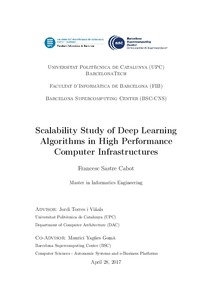Mostra el registre d'ítem simple
Scalability study of Deep Learning algorithms in high performance computer infrastructures
| dc.contributor | Torres Viñals, Jordi |
| dc.contributor.author | Sastre Cabot, Francesc |
| dc.contributor.other | Universitat Politècnica de Catalunya. Departament d'Arquitectura de Computadors |
| dc.date.accessioned | 2017-07-14T07:02:38Z |
| dc.date.available | 2017-07-14T07:02:38Z |
| dc.date.issued | 2017-04-28 |
| dc.identifier.uri | http://hdl.handle.net/2117/106390 |
| dc.description.abstract | Deep learning algorithms base their success on building high learning capacity models with millions of parameters that are tuned in a data-driven fashion. These models are trained by processing millions of examples, so that the development of more accurate algorithms is usually limited by the throughput of the computing devices on which they are trained. This project show how the training of a state-of-the-art neural network for computer vision can be parallelized on a distributed GPU cluster, Minotauro GPU cluster from Barcelona Supercomputing Center with the TensorFlow framework. In this project, two approaches for distributed training are used, the synchronous and the mixed-asynchronous. The effect of distributing the training process is addressed from two different points of view. First, the scalability of the task and its performance in the distributed setting are analyzed. Second, the impact of distributed training methods on the final accuracy of the models is studied. The results show an improvement for both focused areas. On one hand, the experiments show promising results in order to train a neural network faster. The training time is decreased from 106 hours to 16 hours in mixedasynchronous and 12 hours in synchronous. On the other hand we can observe how increasing the numbers of GPUs in one node rises the throughput, images per second, in a near-linear way. Moreover the accuracy can be maintained, like the one node training, in the synchronous methods. |
| dc.language.iso | eng |
| dc.publisher | Universitat Politècnica de Catalunya |
| dc.subject | Àrees temàtiques de la UPC::Informàtica |
| dc.subject.lcsh | Computational grids (Computer systems) |
| dc.subject.lcsh | Machine learning |
| dc.subject.lcsh | Neural networks (Computer science) |
| dc.subject.other | Sistemes paral·lels |
| dc.subject.other | Deep Learning |
| dc.subject.other | Xarxes neuronals convolucionals |
| dc.subject.other | Visió per computador |
| dc.subject.other | Unitat de processament gràfic |
| dc.subject.other | TensorFlow |
| dc.subject.other | Computadores d'altes prestacions |
| dc.subject.other | Minotauro |
| dc.subject.other | BSC |
| dc.subject.other | Parallel Systems |
| dc.subject.other | Convolutional Neural Networks |
| dc.subject.other | Computer Vision |
| dc.subject.other | Graphic Processing Unit |
| dc.subject.other | High Performance Computers |
| dc.title | Scalability study of Deep Learning algorithms in high performance computer infrastructures |
| dc.title.alternative | Estudi d'escalabilitat d'algorismes Deep Learning a infraestructures de computació d'altes prestacions |
| dc.type | Master thesis |
| dc.subject.lemac | Computació distribuïda |
| dc.subject.lemac | Aprenentatge automàtic |
| dc.subject.lemac | Xarxes neuronals (Informàtica) |
| dc.identifier.slug | 122772 |
| dc.rights.access | Open Access |
| dc.date.updated | 2017-05-17T04:00:10Z |
| dc.audience.educationlevel | Màster |
| dc.audience.mediator | Facultat d'Informàtica de Barcelona |
| dc.audience.degree | MÀSTER UNIVERSITARI EN ENGINYERIA INFORMÀTICA (Pla 2012) |
| dc.contributor.covenantee | Barcelona Supercomputing Center |


